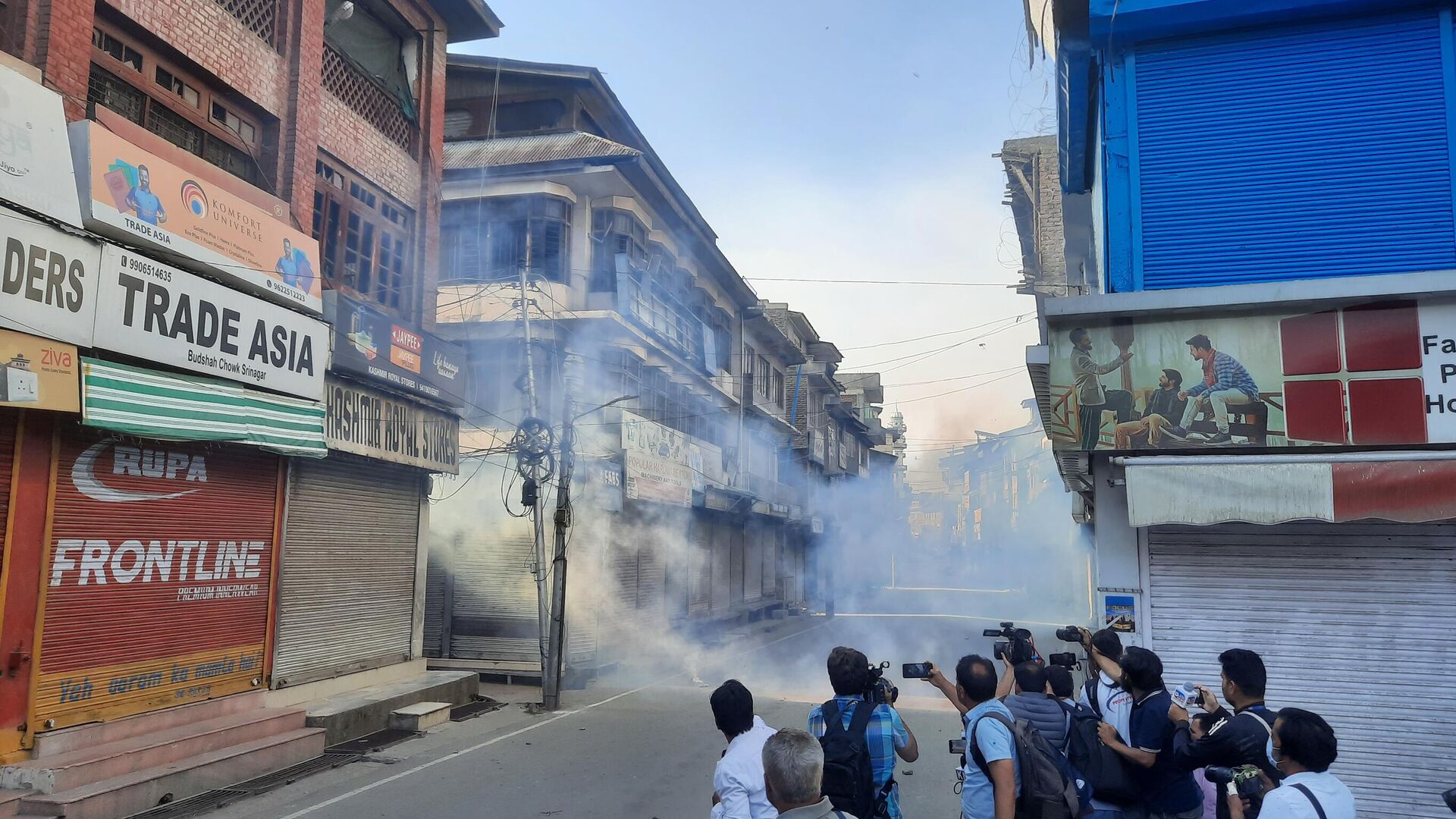https://sputnikglobe.com/20220525/violence-in-kashmir-as-secessionist-leader-yasin-malik-sentenced-to-life-1095772928.html
Violence in Kashmir as Secessionist Leader Yasin Malik Sentenced to Life
Violence in Kashmir as Secessionist Leader Yasin Malik Sentenced to Life
Sputnik International
Yasin Malik was arrested in 2019 in a two-year-old case of “terror and separatist funding” following a suicide bombing that killed 40 Indian paramilitary... 25.05.2022, Sputnik International
2022-05-25T15:45+0000
2022-05-25T15:45+0000
2022-12-08T18:02+0000
jammu kashmir liberation front (jklf)
shehbaz sharif
pakistan
https://cdn1.img.sputnikglobe.com/img/07e6/05/19/1095772290_0:257:2731:1793_1920x0_80_0_0_fe3b720e44738fa840e4b91cbcf9e60a.jpg
Secessionist leader Yasin Malik was given a life sentence in a special New Delhi court on charges that included financing militancy in the Jammu and Kashmir region and waging war against India.The ruling comes days after 56-year-old Malik, who has been held in Delhi’s Tihar jail, pleaded guilty to the charges levelled against him by India’s National Investigation Agency (NIA).Malik headed the banned Jammu and Kashmir Liberation Front (JKLF), which advocated for independence of the restive Himalayan region from both India and Pakistan.Malik faced several charges in multiple cases, including financing terrorism and the alleged killing of four Indian Air Force officials in the early 1990s. In Srinagar, Wednesday was marred with spontaneous shutdowns and violent clashes between protesters and armed police, prompting authorities to increase the security presence in the region and deploy surveillance drones in “sensitive areas”.Shops and key commercial establishments in various parts of the Kashmir region remained shut until late Wednesday evening.Malik's family members and supporters gathered outside his residence and raised slogans against the Indian government and the court’s ruling.In the evening, the protests took a violent turn as clashes erupted between armed police and protesters. The situation in the area remains tense amid a massive police and paramilitary deployment in various parts of Kashmir.Pakistani Prime Minister Shehbaz Sharif issued a statement on Twitter to condemn the court's decision.In Kashmir, M.Y. Tarigami, a senior politician with the Communist Party of India (Marxist), said in a statement that politicians are afraid that it will further compound the uncertainties in the region and will only fuel more “alienation” and “separatist feelings”.“NIA Court has delivered its verdict but not justice. The triumphalism being displayed by the BJP and the corporate media is bound to prove counterproductive. Meanwhile we suggest that Yaseen Malik should avail all legal opportunities to contest this verdict”, said Tarigami who also heads an alliance of Kashmir-based political parties that demand the return of the region’s special autonomy, which was revoked by the Indian government in 2019.Meanwhile, Hindu activist groups in Jammu held processions to celebrate the ruling.Malik has been in jail since 2019, when he was arrested in a massive crackdown on Kashmir-centric parties following a suicide bombing that killed 40 Indian paramilitary soldiers. Indian authorities accused Jaish-e-Mohammed* of carrying out the attack and accused the Pakistani establishment of backing the insurgents in Kashmir, allegations that they deny.In follow-up action by Indian government, many politicians who either advocate for Kashmir’s independence from India or its merger with Pakistan were taken into custody, including Malik.Malik was among the first Kashmiris to join the anti-India insurgency in 1989. He was arrested in 1990. Malik renounced violence and agreed to a unilateral ceasefire in 1994. The Jammu and Kashmir Liberation Front has since adopted non-violent methods in demanding the right to self-determination in both India- and Pakistan-administered Kashmir.*Jaish-e-Mohammed is a terrorist group banned in Russia.
pakistan
Sputnik International
feedback@sputniknews.com
+74956456601
MIA „Rossiya Segodnya“
2022
Azaan Javaid
https://cdn1.img.sputnikglobe.com/img/07e6/03/19/1094183852_0:0:1080:1080_100x100_80_0_0_1fd4d8740a02742b3f72f82306742213.jpg
Azaan Javaid
https://cdn1.img.sputnikglobe.com/img/07e6/03/19/1094183852_0:0:1080:1080_100x100_80_0_0_1fd4d8740a02742b3f72f82306742213.jpg
News
en_EN
Sputnik International
feedback@sputniknews.com
+74956456601
MIA „Rossiya Segodnya“
Sputnik International
feedback@sputniknews.com
+74956456601
MIA „Rossiya Segodnya“
Azaan Javaid
https://cdn1.img.sputnikglobe.com/img/07e6/03/19/1094183852_0:0:1080:1080_100x100_80_0_0_1fd4d8740a02742b3f72f82306742213.jpg
jammu kashmir liberation front (jklf), shehbaz sharif, pakistan
jammu kashmir liberation front (jklf), shehbaz sharif, pakistan
Violence in Kashmir as Secessionist Leader Yasin Malik Sentenced to Life
15:45 GMT 25.05.2022 (Updated: 18:02 GMT 08.12.2022) Yasin Malik was arrested in 2019 in a two-year-old case of “terror and separatist funding” following a suicide bombing that killed 40 Indian paramilitary soldiers in Pulwama, India-administered Kashmir.
Secessionist leader Yasin Malik was given a life sentence in a special New Delhi court on charges that included financing militancy in the Jammu and Kashmir region and waging war against India.
The ruling comes days after 56-year-old Malik, who has been held in Delhi’s Tihar jail, pleaded
guilty to the charges levelled against him by India’s National Investigation Agency (NIA).
Malik headed the banned Jammu and Kashmir Liberation Front (JKLF), which advocated for independence of the restive Himalayan region from both India and Pakistan.
Malik faced several charges in multiple cases, including financing terrorism and the alleged killing of four Indian Air Force officials in the early 1990s.
In Srinagar, Wednesday was marred with spontaneous shutdowns and violent clashes between protesters and armed police, prompting authorities to increase the security presence in the region and deploy surveillance drones in “sensitive areas”.
Shops and key commercial establishments in various parts of the Kashmir region remained shut until late Wednesday evening.
Malik's family members and supporters gathered outside his residence and raised slogans against the Indian government and the court’s ruling.
In the evening, the protests took a violent turn as clashes erupted between armed police and protesters. The situation in the area remains tense amid a massive police and paramilitary deployment in various parts of Kashmir.
Pakistani Prime Minister Shehbaz Sharif issued a statement on Twitter to condemn the court's decision.
“Today is a black day for Indian democracy & its justice system. India can imprison Yasin Malik physically, but it can never imprison idea of freedom he symbolises. Life imprisonment for valiant freedom fighter will provide fresh impetus to Kashmiris' right to self-determination”, Sharif tweeted.
In Kashmir, M.Y. Tarigami, a senior politician with the Communist Party of India (Marxist), said in a statement that politicians are afraid that it will further compound the uncertainties in the region and will only fuel more “alienation” and “separatist feelings”.
“NIA Court has delivered its verdict but not justice. The triumphalism being displayed by the BJP and the corporate media is bound to prove counterproductive. Meanwhile we suggest that Yaseen Malik should avail all legal opportunities to contest this verdict”, said Tarigami who also heads an alliance of Kashmir-based political parties that demand the return of the region’s special autonomy, which was revoked by the Indian government in 2019.
Meanwhile, Hindu activist groups in Jammu held processions to celebrate the ruling.
"Yasin Malik made the valley bleed with the help of Pakistan", Bhartiya Janata Party politician Ravinder Raina told reporters in Jammu city.
Malik has been in jail since 2019, when he was arrested in a massive crackdown on Kashmir-centric parties following a suicide bombing that killed 40 Indian paramilitary soldiers. Indian authorities accused Jaish-e-Mohammed* of carrying out the attack and accused the Pakistani establishment of backing the insurgents in Kashmir, allegations that they deny.
In follow-up action by Indian government, many politicians who either advocate for Kashmir’s independence from India or its merger with Pakistan were taken into custody, including Malik.
Malik was among the first Kashmiris to join the anti-India insurgency in 1989. He was arrested in 1990. Malik renounced violence and agreed to a unilateral ceasefire in 1994. The Jammu and Kashmir Liberation Front has since adopted non-violent methods in demanding the right to self-determination in both India- and Pakistan-administered Kashmir.
*Jaish-e-Mohammed is a terrorist group banned in Russia.


